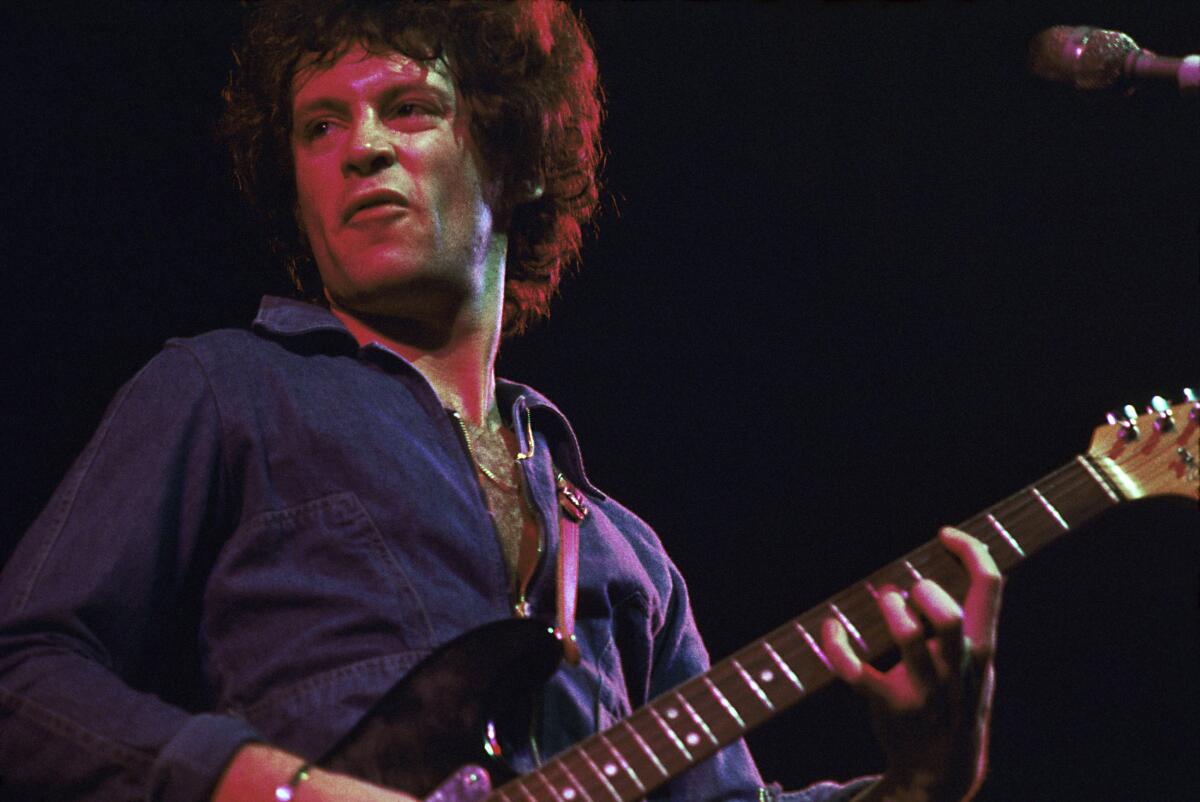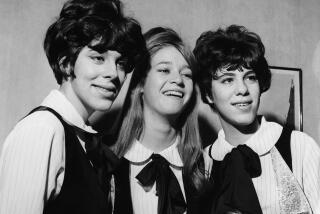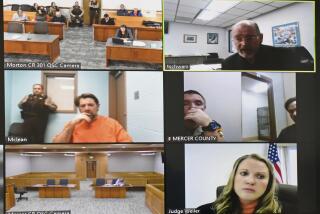Eric Carmen, frontman of the Raspberries and ‘All By Myself’ hitmaker, dies at 74

- Share via
Eric Carmen, the Cleveland rocker who pioneered power pop as the lead singer of the Raspberries and later found solo success with such soft-rock standards as “All By Myself” and “Hungry Eyes,” has died at the age of 74.
His death was announced by his family on his official website. His widow, Amy Carmen, wrote, “It is with tremendous sadness that we share the heartbreaking news of the passing of Eric Carmen. Our sweet, loving and talented Eric passed away in his sleep over the weekend.” The family did not disclose a cause of death or a specific date of death.
Carmen’s first flush of fame arrived in 1972, the year the Raspberries took the hit single “Go All the Way” all the way to No. 5 on the Billboard Hot 100. Melding the heavy riffs of the Who with the candied harmonies of the Beach Boys, “Go All the Way” created the blueprint for the style that became known as power pop: The sweet melodies were given heft by the crunching guitars. Generations of rockers would strive to replicate the sugared hard rock of the Raspberries, but Carmen wound up softening his attack after he parted ways with the group. “All By Myself,” the languid soft-rock ballad that launched his solo career, almost topped the Billboard charts in 1976 and became a pop perennial, covered by everyone from Celine Dion to Hank Williams Jr.
During the decade that followed “All By Myself,” Carmen remained a staple on adult contemporary and album rock radio, finally achieving another smash when “Hungry Eyes,” his contribution to the “Dirty Dancing” soundtrack, reached No. 4 on the Hot 100 in 1988, followed swiftly to the upper reaches of the charts that year by “Make Me Lose Control.” It may have been Carmen’s last run of hits but it cemented his status as a pop craftsman.
Born in Cleveland on Aug. 11, 1949, Carmen initially learned to play classical piano but, like many teenagers of his generation, he fell in love with pop music after the Beatles brought the British Invasion crashing upon American shores. Picking up the guitar, Carmen cycled through a variety of Cleveland bands, eventually winding up playing in Cyrus Erie, which released the single “Sparrow” in 1968. Carmen then joined the Choir, a garage group whose chiming local hit “It’s Cold Outside” demonstrated an equal debt to the Byrds and the Kinks. Dann Klawon, the song’s author, departed the Choir by the time Carmen joined guitarist Wally Bryson, guitarist Dave Smalley and drummer Jim Bonfanti, a quartet that soon evolved into the Raspberries.
Prizing succinct song form and immediate melody, the Raspberries stood in contrast to the shaggy jams and ponderous prog that littered the rock landscape in the early 1970s. Their allegiance to punchy hooks helped the group land on AM airwaves while their roaring guitar suited FM radio. It was a combination that paid off handsomely with the cheerfully carnal “Go All the Way.” The song offered a modern update on 1960s pop that came to define a certain strand of 1970s rock: catchy enough to pass as pop, hard enough to feel like rock.
Initially appealing to a wide audience — “Go All the Way” reached the Billboard Top 10 — this blend wound up leaving the Raspberries without a firm audience; they were too pop for rock, too rock for pop. “I Wanna Be With You,” the lead single from their second album “Fresh,” performed respectably but soon such hooky singles as “Tonight” and “I’m a Rocker” stalled far outside the Top 40. “Overnight Sensation (Hit Record)” — a paean to the power of pop radio that’s as much a power pop ur-text as “Go All the Way” — proved to be a last hurrah for the group: After it peaked at No. 18 in 1974, the group parted ways.
Eric Carmen immediately resurfaced in 1975 with a self-titled solo debut that showcased a deliberately gentler singer; when he sang “That’s Rock ‘n’ Roll” it was no statement of defiance, it was an unabashed celebration of good-time oldies. “All By Myself,” the record’s sentimental centerpiece, firmly moved the singer-songwriter into soft rock, its mournful melody partially based on Sergei Rachmaninoff‘s “Piano Concerto No. 2 in C minor” turning the ballad into an enduring standard. The livelier “Never Gonna Fall in Love Again” — also based on a Rachmaninoff melody — came close to replicating that success, peaking at No.11 on the Hot 100 on its way to topping the adult contemporary charts, a place Carmen called home for the next decade.
Although Carmen did attempt to follow fashion — “Tonight You’re Mine” clattered with attempts at co-opting the digital blare of New Wave, while the sleek “I Wanna Hear It From Your Lips” suited the airbrushed contours of MTV — he struggled to find a footing on the pop charts of the 1980s. He finally righted himself within the nostalgia of “Dirty Dancing,” a 1987 blockbuster set in 1963. “Hungry Eyes,” his contribution to its soundtrack, draped adolescent longing in synthesizers, a combination that sent it to the top of the charts; it easily became his biggest hit since “All By Myself,” reaching No. 4 early in 1988. “Make Me Lose Control,” a bombastic fusion of Bruce Springsteen and Beach Boys, bettered it, peaking at No. 3.
“Make Me Lose Control” didn’t belong to a parent album, a sign that Carmen’s productivity was starting to dwindle. He didn’t release another album until “Winter Dreams” arrived in Japan in 1998; the album was released stateside as “I Was Born to Love You” in 2000. After touring as part of Ringo Starr’s All-Starr Band in 2000, Carmen devoted his attention to a Raspberries reunion in the mid-2000s. The Raspberries returned to the stage at the opening of Cleveland’s House of Blues in 2004 — the hometown show later was released as the 2017 album “Pop Art Live” — then mounted a short tour in 2005, with a concert from the House of Blues Los Angeles appearing as “Live on Sunset Strip” in 2007; the album featured liner notes from Bruce Springsteen.
Carmen released the ballad “Brand New Year” in December 2013 as a teaser to the compilation “The Essential Eric Carmen.” It was the first new music he completed since 1999 and the last song he released in his lifetime.
In lieu of new music, Carmen developed a reputation as a combative conservative presence on Twitter in the late 2010s; he retreated from social media by the early 2020s.
Carmen is survived by his third wife, Amy Murphy, whom he married in 2016.
More to Read
The biggest entertainment stories
Get our big stories about Hollywood, film, television, music, arts, culture and more right in your inbox as soon as they publish.
You may occasionally receive promotional content from the Los Angeles Times.








